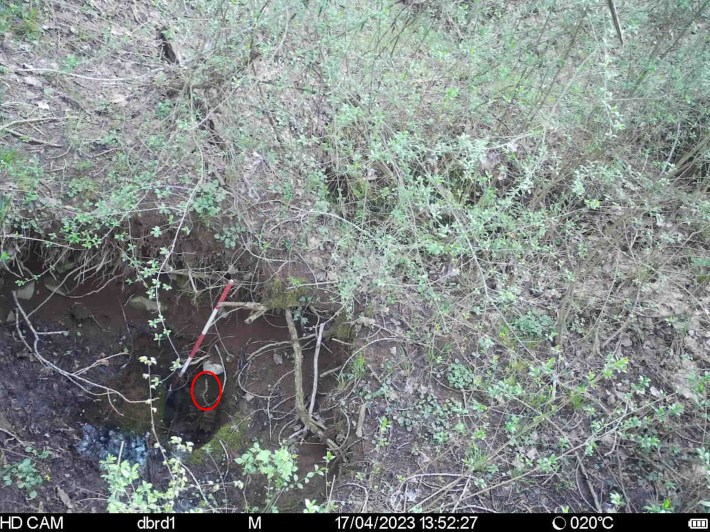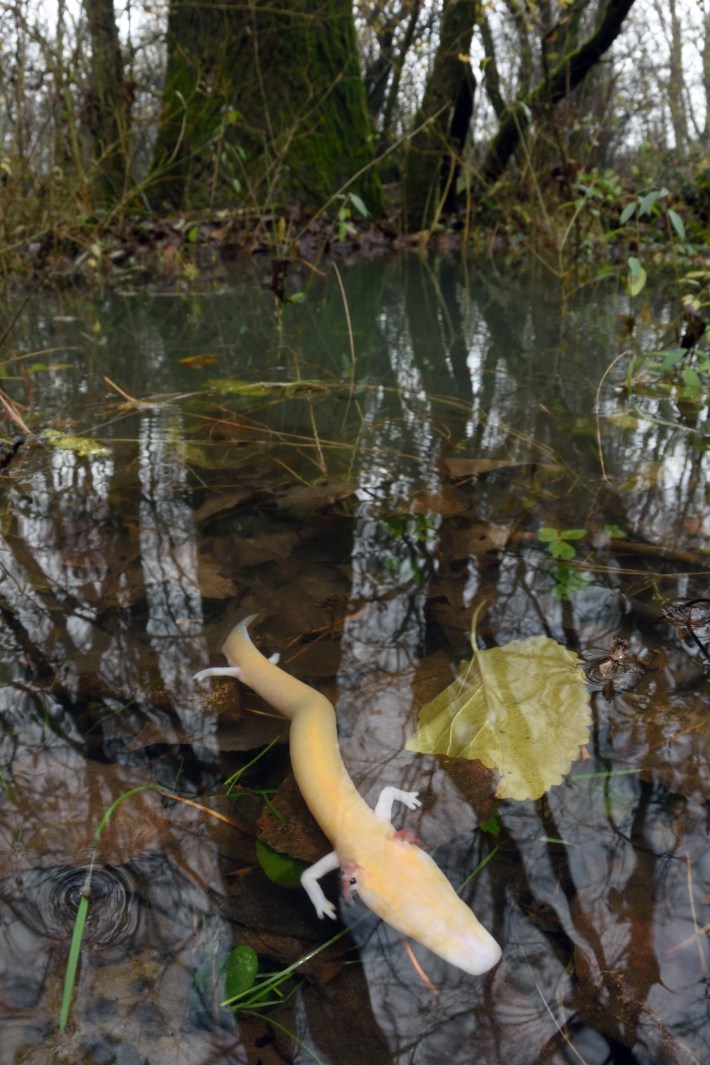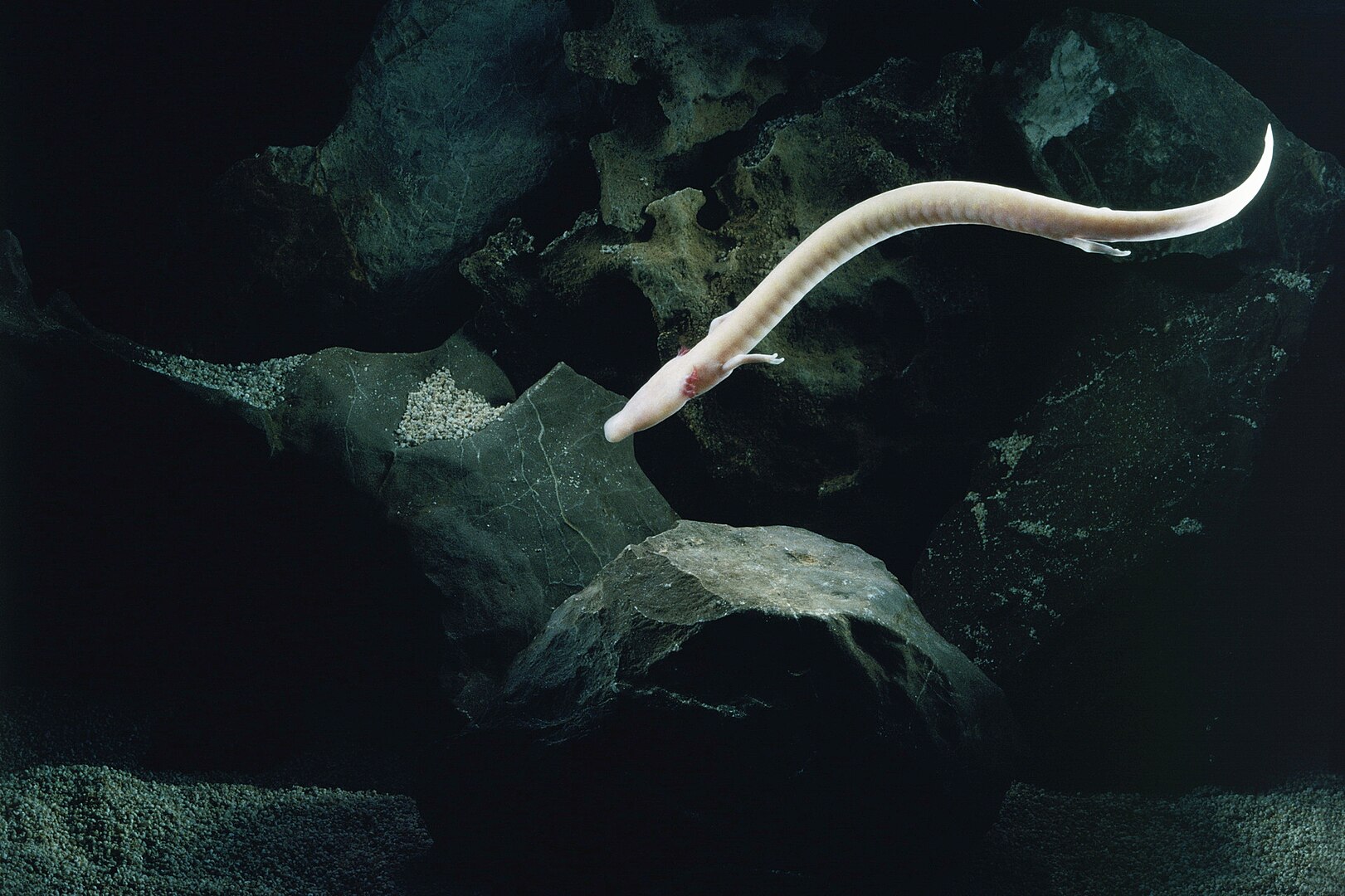There I was, going about my morning constitutional in absolute solitude—or so I thought. I had just wriggled out of my sunken limestone cave, having slowly clambered up to the sunlit waters of the surface, when I had the sudden suspicion that I was being watched. I couldn't see the intruders—alas, I have no eyes—but I could hear them. The slosh of boots hitting waterlogged leaves. The whirring click of a camera. The mellifluous tones of a romance language. For reasons then unknown to me, I'd been followed by a posse of humans intent on taking my photo, without warning and for purposes they neglected to explain to me. Can't a blind cave salamander go on a jaunty little walk without getting papped?
Now the news is out, first in a paper published in Ecology and then by thirsty, fiendish tabloids and other rags not even fit to wipe the bottom of my boot, if I were ever to wear one. Now everyone who reads The New York Times cover-to-cover—which I suppose is very few actual people, perhaps a relief—know about my little strolls from the subterranean to the surface. The fact that they know about my strolls is not the issue; I have never tried to hide my strolls. What I mind is people being so weird about it! Imagine if every time you left your apartment to go get a snack you had to dodge the flashing cameras of one to eight Italian biologists who were literally obsessed with you. They didn't only monitor the exit to my cave; they also watched nine other caves and also 69 above-ground springs in northeastern Italy for wandering olms. I never asked for this level of fame!
But like any nepo baby, I also know the stardom into which I was born has an ancient lineage that long precedes me. I am an olm, a species of aquatic salamander that has become pale and blind after living underground for millions of years. Us olms are reclusive celebrities, as far as salamanders go. My species evolved in southern Europe, and in the 17th century people living around Postojnska Cave believed we were baby dragons because they believed a warm air wafting up from our cave was a dragon's smoke. Alas, those were the days when being an olm meant something. A time when being an olm meant you were revered, or even feared, by people who had never even heard of a camera or a free press! The Italian physicist and naturalist Giovanni Antonio Scopoli was the first to capture a living olm from our cave system, and since then people have simply been obsessed with us.

Who could blame them? We grow as long as bananas and look not unlike Facetuned worms, with poreless bodies paler than strawberry milk. We have four short legs with a smattering of digits on each foot. We don't need much oxygen, and we can live longer than a century. Sure, we don't have eyes, but we can sense vibrations, magnetic fields, and chemicals. And this is clearly all we need to navigate not just the world of our caves, but also the world of the surface.
Yet some scientists consider us underground, cave-dwelling olms to be examples of "regressive" evolution because we've lost our eyes, betraying their jejune opinion of the life-changing power of committing to the bit, evolutionarily speaking. The scientists see these extreme adaptations as proof that we are evolutionary "dead ends"—where else could we evolve from here?—and perhaps they are right. This kind of limited thinking prevented the scientists from imagining that a little olm like me could survive outside of the abyss of my cave. But to be frank, I do not often concern myself with the evolutionary future of my species. I am concerned with my future. When I die, perhaps a century from now, what will I have made of this life? What will I have done with my time on Earth?
I didn't always think this way. I grew up like any other olm. I swam. I ate—shrimp, insect larvae, even snails. Because food can be scarce in my cave, I often went years without eating. But then I learned about one particular olm, who I had never met, but whose story I shall never forget as long as I may live. Researchers who labeled and tracked several olms in the caves of eastern Bosnia-Herzegovina found that one olm stayed in the same exact spot for 2,569 days. When I learned about this olm, my heart nearly fell out of my chest. Staying in the same tiny patch of cave for more than seven years? I could not imagine it. What kind of life was this? New Scientist called that olm lazy, where I might have called that olm clinically depressed.
Ever since that day, I vowed I would not be like that olm. Sure, I might not be able to see the world on account of my lack of eyes, but I can certainly sense it! What did vibrations feel like above the surface? What magnetic fields existed beyond my cave? I needed to know what lurked above, not for any specific purpose beyond the passion that comes from wandering and observing the world. Can an olm not be a flâneur?

The surface was everything I could have imagined, and more. It was a banquet of wonderful creatures eerily like me—long, thin, pink, and eyeless. I was stunned that a creature like an earthworm would not also dwell in a cave, one of the many mysteries of life I am beginning to unravel. But I was glad to encounter them on the surface and slurped them readily, meals that would have lasted me years if those pesky biologists hadn't picked me up, startled me, and caused me and four other olms to vomit up our earthworm feasts. It's one thing to be hounded by cameras, it's another to have the paparazzi literally scare the food right out of your stomach! But I was not without hope, as I now knew the surface of the Earth to be riddled with earthworms, plump and ripe for the slurping. And once this news cycle dies down, my fellow olms and I will be free once again to rise from our caverns and hunt under a beautifully dappled light we will never be able to perceive. Then we will be free, as Charles Baudelaire wrote, "to be away from home and yet to feel oneself everywhere at home; to see the world, to be at the centre of the world, and yet to remain hidden from the world—impartial natures which the tongue can but clumsily define.” Let my tongue clumsily define some more of those tasty worms!
Before I return to my cave, I want to leave you with this: As another creature with a lifespan that can last a century or longer, what will be your legacy? Will you be the human who stayed in one place for seven years—safe, surely, but excised from the world and its wonders—or will you leave fear behind and wriggle forth into some brave new world and its ephemeral pleasures? Will you languish, or will you live? I cannot promise there will be worms where you go, but for your sake, I hope they're there—fat, juicy, and enough to nourish you for years.






